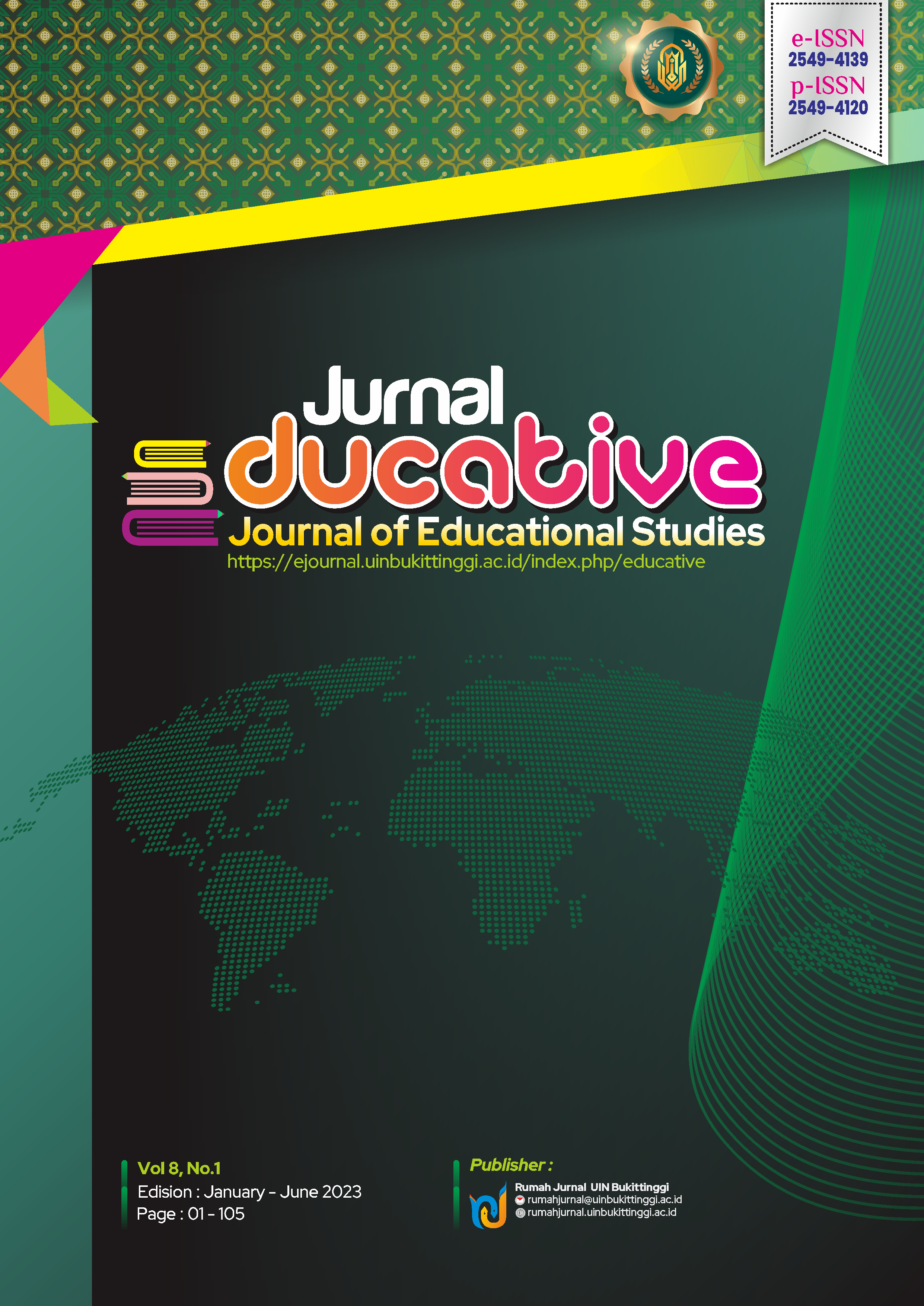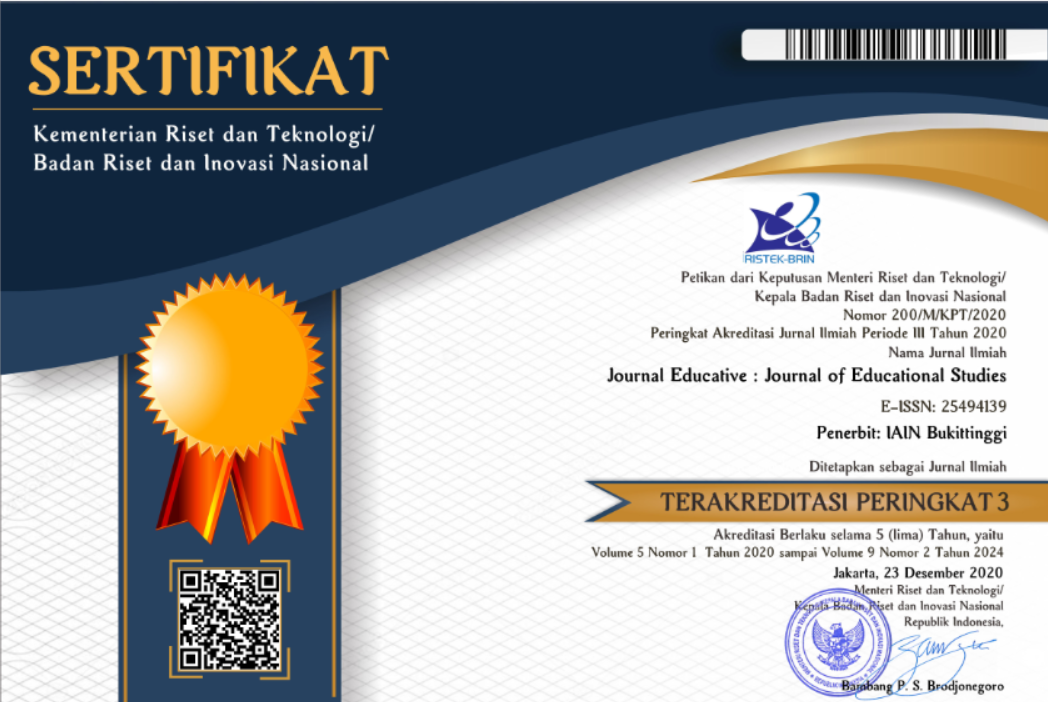Promoting Authentic Interaction: Investigating Student-Generated Role Play for Pragmatic Skills Development in Indonesian Vocational Efl Students
DOI:
https://doi.org/10.30983/educative.v10i1.9580Keywords:
Authentic Interaction, Pragmatic Competence, Role playAbstract
This article examines the use of role-play in teaching pragmatic skills to the vocational students with the aim of promoting authentic interaction from Indonesian vocational students of English as a foreign language (EFL). The investigation adopts a qualitative perspective, as it recognizes the constraints of pre-set scripts in cultivating context-specific communication skills, by analyzing how student-generated role play in diverse contexts may cultivate pragmatic attunement and facilitate participation. Students in the fourth semester of an English for Tour and Travel class worked together to design workplace communication tasks based on video models and real-life experiences. Research data included classroom observations, video recordings of students’ performances, and post-project interviews. It is found that the students progressed in the use of speech acts, politeness strategies, and turn taking in spoken interactions. These roles play activities enabled not only improvised speech practice and peer feedback but also provided an opportunity for language learners to reflect cultural norms and communication intentions. The research reinforces the importance of moving away from static textbook discussions to the dynamic real-world tasks that approximate actual use of the language. It points to the need for the inclusion of pragmatic competence in speaking instruction, especially in vocational EFL contexts where work-related communication and sociopragmatic awareness are important.
References
Miles, Mattew B., Huberman, A Michael., Saldana, Johnny, Qualitative Data Analysis: A Methods Sourcebook, 1994
Al-Ghamdi, N. A., Almansoob, N. T., & Alrefaee, Y. (2019). Pragmatic failure in the realization of the speech act of responding to compliments among Yemeni EFL undergraduates. 3L: Language, Linguistics, Literature, 25(4), 227–240. https://doi.org/10.17576/3L-2019-2504-14
Alzubi, A. A., Nazim, M., & Ahamad, J. (2024). Examining the effect of a collaborative learning intervention on EFL students’ English learning and social interaction. Journal of Pedagogical Research, 8(2), 26–46. https://doi.org/10.33902/JPR.202425541
Bardis, B., Silman, F., & Mohammadzadeh, B. (2021). Cross-cultural pragmatic competence in an efl context for a sustainable learning environment: A case of northern cyprus. Sustainability (Switzerland), 13(18). https://doi.org/10.3390/su131810346
Beauchamp, M. L. H., Rezzonico, S., Bennett, T., Duku, E., Georgiades, S., Kerns, C., Mirenda, P., Richard, A., Smith, I. M., Szatmari, P., Vaillancourt, T., Waddell, C., Zaidman-Zait, A., Zwaigenbaum, L., & Elsabbagh, M. (2023). The Influence of Bilingual Language Exposure on the Narrative, Social and Pragmatic Abilities of School-Aged Children on the Autism Spectrum. Journal of Autism and Developmental Disorders, 53(12), 4577–4590. https://doi.org/10.1007/s10803-022-05678-w
Cappelli, G., Noccetti, S., Arcara, G., & Bambini, V. (2018). Pragmatic competence and its relationship with the linguistic and cognitive profile of young adults with dyslexia. Dyslexia, 24(3), 294–306. https://doi.org/10.1002/dys.1588
Chen, Z. (2023). Proceedings of the 2022 4th International Conference on Literature, Art and Human Development (ICLAHD 2022). In Proceedings of the 2022 4th International Conference on Literature, Art and Human Development (ICLAHD 2022). Atlantis Press SARL. https://doi.org/10.2991/978-2-494069-97-8
Chiu, E. F. Y., Chen, Y. S., & Tai, H. Y. (2022). Investigations into EFL Students’ Pragmatic and Grammatical Awareness through Peer Collaboration. Sustainability (Switzerland), 14(17), 1–18. https://doi.org/10.3390/su141710568
Gan, L. (2024). Application of Fuzzy Neural Network in Teaching Spoken English for Tourism. Informatica (Slovenia), 48(5), 135–144. https://doi.org/10.31449/inf.v48i5.5300
Hu, Z., & Navarrete, E. (2024). Understanding the impact of foreign language on social norms through lies. Bilingualism. https://doi.org/10.1017/S1366728924000373
Jamil, A. A., & Mahmood, A. H. (2023). An Investigation of Teachers’ Attitude towards developing Kurdish EFL University Students’ Sociopragmatic Competence. Journal of Language Studies, 6(3, 2), 118–131. https://doi.org/10.25130/jls.6.3.2.9
Järvelä, S., & Rose, C. P. (2022). Novel CSCL design processes prompted by exploration of role-playing and emotions. International Journal of Computer-Supported Collaborative Learning, 17(4), 457–461. https://doi.org/10.1007/s11412-022-09383-9
Karlik, M. (2023). EXPLORING THE IMPACT OF CULTURE ON LANGUAGE LEARNING: HOW UNDERSTANDING CULTURAL CONTEXT AND VALUES CAN DEEPEN LANGUAGE ACQUISITION. International Journal of Language, Linguistics, Literature and Culture, 02(05).
Kim, Y., & Taguchi, N. (2016). Learner-Learner Interaction During Collaborative Pragmatic Tasks: The Role of Cognitive and Pragmatic Task Demands. Foreign Language Annals, 49(1), 42–57. https://doi.org/10.1111/flan.12180
Klimova, I. I., Klimova, G. V., & Dubinka, S. A. (2019). Students’ communicative competence in the context of intercultural business communication. XLinguae, 12(1), 207–218. https://doi.org/10.18355/XL.2019.12.01.16
Kontra, E. H. (1996). Introducing Pragmatic Awareness at Low Levels.
Kuang, J., & Bicchieri, C. (2024). Language matters: how normative expressions shape norm perception and affect norm compliance. Philosophical Transactions of the Royal Society B: Biological Sciences, 379(1897). https://doi.org/10.1098/rstb.2023.0037
Liu, H. (2020). Cultivation of Students’ Cultural Pragmatic Competence in College English Translation Teaching. Learning & Education, 9(1), 33. https://doi.org/10.18282/l-e.v9i1.901
Míguez-Álvarez, C. (2024). Process drama and foreign language learning: A case study of preservice teachers learning French. Foreign Language Annals, January, 227–246. https://doi.org/10.1111/flan.12785
Miles, Mattew B., Huberman, A Michael., Saldana, J. (1994). Qualitative Data Analysis: A Methods Sourcebook.
Monaghan, P., Ruiz, S., & Rebuschat, P. (2021). The role of feedback and instruction on the cross-situational learning of vocabulary and morphosyntax: Mixed effects models reveal local and global effects on acquisition. Second Language Research, 37(2), 261–289. https://doi.org/10.1177/0267658320927741
Nazlı, G. (2016). Sociopragmatic elements and possible failure in EFL teaching. Dil Dergisi, 0(167), 49–66. https://doi.org/10.1501/dilder_0000000229
Pamungkas, N. A. R., & Wulandari, L. T. (2020). Pragmatics in Efl Classroom: Avoiding Pragmatic Failure in Cross-Cultural Communication. English Education : Journal of English Teaching and Research, 5(1), 74–91. https://doi.org/10.29407/jetar.v5i1.14310
Shankar, P. R., Piryani, R. M., Singh, K. K., & Karki, B. M. S. (2012). Student feedback about the use of role plays in Sparshanam, a medical humanities module. F1000Research, 1, 1–11. https://doi.org/10.12688/f1000research.1-65.v1
Wahyuningsih, S., & Ziyana Untsa, F. (2023). English as Business Lingua Franca: Examining the Use of English in Indonesian Online Business. ELT-Lectura, 10(2), 96–104. https://doi.org/10.31849/elt-lectura.v10i2.13699
Wijayanti, F. ; A. B. B. (2021). The Journal of Asia TEFL Building University Students ’ Awareness of Socio -Pragmatic Meaning : 18(2), 673–681.
Wijayanti, F., & Miqawati, A. H. (2022). Activities to Foster The Students’ Socio-pragmatics Awareness: a Locally Situated Process. Journal of English in Academic and Professional Communication, 8(2), 44–50. https://doi.org/10.25047/jeapco.v8i2.3881
Xu, C. (2024). Intercultural Communication Competence: Theoretical Exploration and Practical Application from the Perspective of Foreign Language Education. Communications in Humanities Research, 37(1), 176–184. https://doi.org/10.54254/2753-7064/37/20240180
Yao, Y., & Du-Babcock, B. (2023). English as a Lingua Franca in Mainland China: An Analysis of Intercultural Business Communicative Competence. International Journal of Business Communication, 60(1), 3–23. https://doi.org/10.1177/2329488419898221
Zondag, A., Larsen, A. B., Guldal, T. M., & van den Tillaar, R. (2020). The influence of improvisation activities on speaking confidence of EFL student teachers. Nordisk Tidsskrift for Utdanning Og Praksis, 14(2), 82–102. https://doi.org/10.23865/UP.V14.1879
Zughaibi, A. A. (2022). The barefoot shoemaker’s son: examining EFL teachers’ pragmatic competence in a Saudi context. Saudi Journal of Language Studies, 2(2), 68–83. https://doi.org/10.1108/sjls-02-2022-0013
Downloads
Published
How to Cite
Issue
Section
Citation Check
License
Copyright (c) 2025 Fitri wijayanti, Alfi Hidayatu Miqawati

This work is licensed under a Creative Commons Attribution-ShareAlike 4.0 International License.
Authors who publish with this journal agree to the following terms:
1. Authors retain copyright and grant the journal right of first publication with the work simultaneously licensed under a Creative Commons Attribution License that allows others to share the work with an acknowledgment of the work's authorship and initial publication in this journal.
2. Authors are able to enter into separate, additional contractual arrangements for the non-exclusive distribution of the journal's published version of the work (e.g., post it to an institutional repository or publish it in a book), with an acknowledgment of its initial publication in this journal.
3. Authors are permitted and encouraged to post their work online (e.g., in institutional repositories or on their website) prior to and during the submission process, as it can lead to productive exchanges, as well as earlier and greater citation of published work (See The Effect of Open Access).




